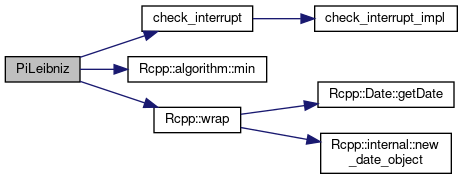Loading...
Searching...
No Matches
Include dependency graph for piWithInterrupts.cpp:

Go to the source code of this file.
Classes | |
| class | interrupt_exception |
Functions | |
| static void | check_interrupt_impl (void *) |
| bool | check_interrupt () |
| RcppExport SEXP | PiLeibniz (SEXP n, SEXP frequency) |
Function Documentation
◆ check_interrupt()
|
inline |
Call this method to check for user interrupts. This is based on the results of a discussion on the R-devel mailing list, suggested by Simon Urbanek.
- Attention
- This method must not be called by any other thread than the master thread. If called from within an OpenMP parallel for loop, make sure to check for omp_get_thread_num()==0 before calling this method!
- Returns
- True, if a user interrupt has been detected.
Definition at line 64 of file piWithInterrupts.cpp.
References check_interrupt_impl().
Referenced by PiLeibniz().
Here is the call graph for this function:

◆ check_interrupt_impl()
|
inlinestatic |
Do the actual check for an interrupt.
- Attention
- This method should never be called directly.
- Parameters
-
[in] dummy Dummy argument.
Definition at line 50 of file piWithInterrupts.cpp.
Referenced by check_interrupt().
◆ PiLeibniz()
| RcppExport SEXP PiLeibniz | ( | SEXP | n, |
| SEXP | frequency | ||
| ) |
Compute pi using the Leibniz formula (a very inefficient approach).
- Parameters
-
[in] n Number of summands [in] frequency Check for interrupts after every frequencyloop cycles.
Definition at line 75 of file piWithInterrupts.cpp.
References Rcpp::as(), BEGIN_RCPP, check_interrupt(), END_RCPP, and Rcpp::wrap().
Here is the call graph for this function:
